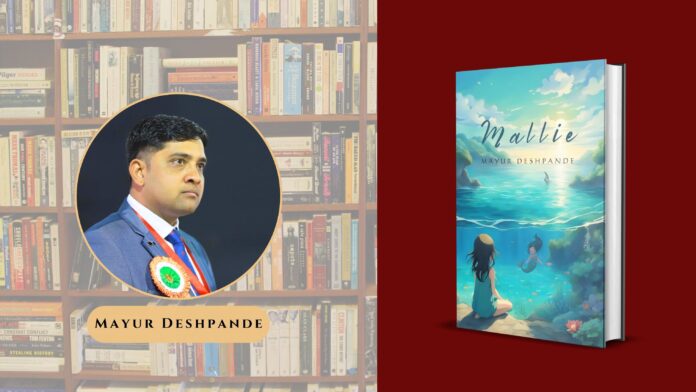Published in January 2024, the novel Mallie by Mayur Deshpande has quickly emerged as a poignant and thought-provoking piece of literature. It delves into profound themes of human progress and the delicate balance between societal expectations and individual freedom. The novel is a testament to Deshpande’s narrative skill and his ability to intertwine complex philosophical ideas with an engaging story.
At its heart, Mallie tells the story of a father and his daughter, Mallie, whose life takes a remarkable turn when she discovers her unique ability to shape-shift. Deshpande draws upon the fascinating concept of therianthropy—the mythical ability to transform into an animal—to create a narrative that is both magical and deeply rooted in contemporary concerns. Mallie’s transformations, especially into a mermaid, serve as a metaphorical lens through which the reader can explore the tensions between humanity and nature, progress and destruction, acceptance and fear.
Mallie’s realization of her shape-shifting abilities sparks both wonder and apprehension within her social circle. While some people display compassion and curiosity, others react with fear and prejudice. This duality reflects the broader societal challenge of embracing differences and respecting personal choices. Through Mallie’s story, Deshpande critiques the irrational limitations imposed by societal norms and highlights the importance of liberal acceptance.
One of the most touching aspects of Mallie is the unwavering support her father provides. As Mallie grapples with her newfound identity and the weight of her decision to permanently transform into a mermaid, her father’s love and respect shine through. This relationship underscores the novel’s message about the power of familial bonds and the importance of respecting a child’s autonomy. By standing by Mallie, her father exemplifies the strength of unconditional love and the courage to challenge societal expectations.
A pivotal moment in the novel is Mallie’s visit to the shawl, where she fully transforms into a mermaid. In this transformative experience, she gains a unique perspective on the interconnectedness of life. Observing the contrast between humans and other creatures, Mallie identifies the self-destructive tendencies of humanity. While humans have positioned themselves as the most advanced species, their relentless pursuit of progress has often come at the cost of nature. Other animals, less “progressive” in human terms, coexist harmoniously with their environment, ensuring their survival.
The climax of the novel is marked by Mallie’s farewell speech, a deeply moving reflection on the “cost of progress.” In this moment, she articulates a searing critique of humanity’s selfishness and its consequences. Mallie’s words serve as a wake-up call, urging readers to reconsider their relationship with nature and the ethical dimensions of human advancement. She reminds us that progress is never free; someone or something always pays the price. In humanity’s case, it is the environment that bears the brunt of our unyielding ambition.
Deshpande’s inspiration for Mallie came from his own daughter, whose creativity and perspective shaped the novel’s themes. The book represents two years of dedication, during which Deshpande meticulously crafted a story that balances personal, societal, and environmental concerns. Published by Power Publishers, Kolkata, Mallie is a deeply personal work that resonates with universal themes.
Deshpande’s background as an engineer and his passion for writing have imbued his storytelling with a unique blend of analytical rigor and creative expression. His exploration of therianthropy and its implications is both imaginative and grounded, making Mallie a compelling read for audiences across age groups.
In a world grappling with environmental crises and growing societal divides, Mallie offers a timely and thought-provoking narrative. The novel challenges readers to reflect on their own values and the legacy they wish to leave for future generations. It is not merely a story about a girl with special powers; it is a profound meditation on what it means to be human.
The book’s exploration of themes such as acceptance, environmental stewardship, and the ethical dilemmas of progress make it a must-read for anyone seeking a deeper understanding of the human condition. Through Mallie’s journey, readers are invited to question societal norms and consider the cost of their actions on the world around them.
Mallie is more than a novel; it is a call to action. As you turn its pages, you’ll find yourself questioning long-held beliefs and gaining a renewed appreciation for the delicate balance of life on Earth. Deshpande’s work reminds us that change begins with understanding and empathy.
If you haven’t yet picked up a copy of Mallie, now is the time. This powerful and beautifully written novel will leave you inspired, reflective, and hopeful. It is a story that stays with you long after you’ve turned the final page, urging you to make choices that honor both humanity and the planet. Dive into Mallie and join the conversation about progress, compassion, and the future of our world.

















